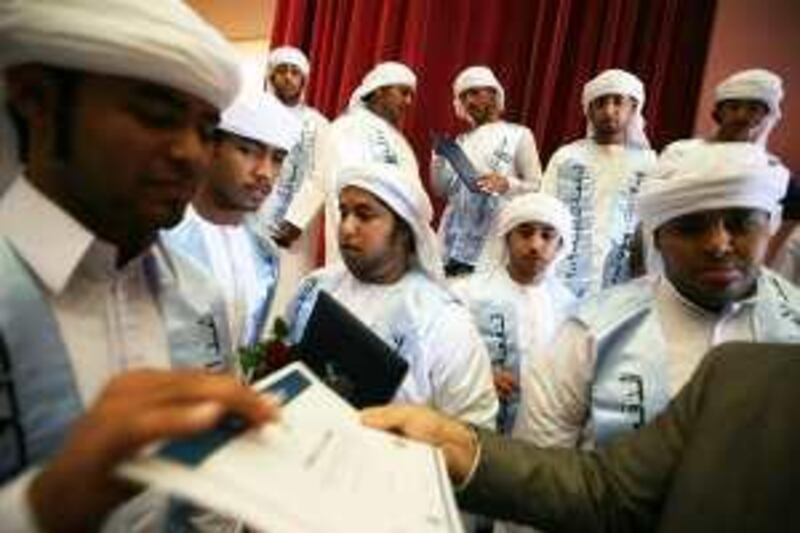ABU DHABI // Scores of Emiratis who did not complete school have been given another chance at a career after graduating from a vocational education centre. Yesterday the second group of graduates from the Vocational Education Development Centre were presented with certificates and most of them are going on to begin training with major employers in the automotive, petroleum, electronics or other industries.
All the students at the centre near Shahama had failed to get their school-leaving certificate, and faced bleak career prospects without it. Some admit they had been too lazy to study when younger, while for others family and other social problems had compromised their efforts at school. Fadhal Hejail, 20, who was awarded first prize in mechanical engineering at yesterday's graduation, said he felt a sense of "great achievement" and had enjoyed the practical training at the VEDC more than being at school.
"Seriously, I was very lazy in my studies [at school]," he said. "I wanted to work with my hands in a workshop." Mr Hejail, who comes from Al Ain, now has a training contract with the petroleum company Total and hopes to complete a diploma. The centre was founded in 2006 as an offshoot of the Institute of Applied Technology (IAT), which has five other campuses around the country for students who completed their school education.
The 72 students who graduated yesterday, after specialising in areas such as automotive engineering and IT, have each completed a three-year vocational education course. Most will go on to two-year traineeships in industry; for many of these training courses, students will return to the VEDC for additional lessons in-between time at work. The VEDC, which has 1,005 students, all male, also offers a five-year technical education course that prepares students to start higher education.
Dr Abdullatif al Shamsi, the director general of the IAT, described the centre as "a very noble project" and said it was "very different" from school. "These are the students who could have been a trouble to society because they didn't have the chance to continue their education. They're dropouts," he said. "They could be very clever, but for whatever reason they had problems. We give them another chance to pursue their education and give them work placements to bring them to the level where they become productive within society."
The certificate awarded by the centre, Dr al Shamsi said, was "internationally benchmarked" and accredited by the Ministry of Education. Saeed bin Samuidaa, 19, from Abu Dhabi, is also going to work for Total. He enrolled at the VEDC after failing grade 10 at school. He did not enjoy all aspects of being at the centre, including having to sleep there during the week and being able to return to his family only at weekends. But he said overall his prospects had improved significantly thanks to his time there.
"Before I came here, I didn't know any future," he said. "But now I can see my future." Another graduate yesterday was Nayef al Kurbi, 20, from Abu Dhabi, whose school career came to an end when he failed grade eight three times. Without the opportunity to restart his education at the VEDC, Mr al Kurbi said he "wouldn't have a nice future in my life". "This is important for me because I thought to myself, 'I'm losing my future, I'm losing everything, I cannot study, I'm lazy.'"
He now plans to work at a power plant. dbardsley@thenational.ae







